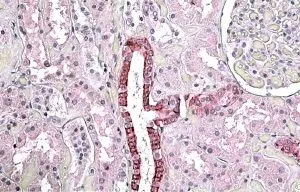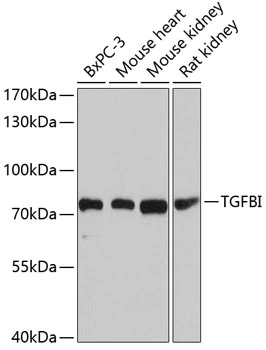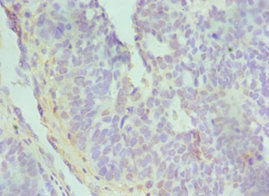
WB analysis of human kidney lysate using GTX88213 TGFBI antibody, Internal. Dilution : 0.3μg/ml Loading : 35μg protein in RIPA buffer
TGFBI antibody, Internal
GTX88213
ApplicationsWestern Blot, ImmunoHistoChemistry, ImmunoHistoChemistry Paraffin
Product group Antibodies
ReactivityHuman
TargetTGFBI
Overview
- SupplierGeneTex
- Product NameTGFBI antibody, Internal
- Delivery Days Customer9
- Application Supplier NoteWB: 0.2-0.5microg/ml. IHC-P: 4-6microg/ml. *Optimal dilutions/concentrations should be determined by the researcher.Not tested in other applications.
- ApplicationsWestern Blot, ImmunoHistoChemistry, ImmunoHistoChemistry Paraffin
- CertificationResearch Use Only
- ClonalityPolyclonal
- Concentration0.50 mg/ml
- ConjugateUnconjugated
- Gene ID7045
- Target nameTGFBI
- Target descriptiontransforming growth factor beta induced
- Target synonymsBIGH3, CDB1, CDG2, CDGG1, CSD, CSD1, CSD2, CSD3, EBMD, LCD1, transforming growth factor-beta-induced protein ig-h3, RGD-CAP, RGD-containing collagen-associated protein, beta ig-h3, betaig-h3, kerato-epithelin, transforming growth factor beta-induced 68kDa, transforming growth factor, beta-induced, 68kD
- HostGoat
- IsotypeIgG
- Protein IDQ15582
- Protein NameTransforming growth factor-beta-induced protein ig-h3
- Scientific DescriptionThis gene encodes an RGD-containing protein that binds to type I, II and IV collagens. The RGD motif is found in many extracellular matrix proteins modulating cell adhesion and serves as a ligand recognition sequence for several integrins. This protein plays a role in cell-collagen interactions and may be involved in endochondrial bone formation in cartilage. The protein is induced by transforming growth factor-beta and acts to inhibit cell adhesion. Mutations in this gene are associated with multiple types of corneal dystrophy. [provided by RefSeq, Jul 2008]
- ReactivityHuman
- Storage Instruction-20°C or -80°C,2°C to 8°C
- UNSPSC12352203








![WB analysis of HEK293 expressing human beta IG-H3 using GTX53070 TGFBI antibody [30G12].](https://www.genetex.com/upload/website/prouct_img/normal/GTX53070/GTX53070_20191119_WB_w_23060900_824.webp)
